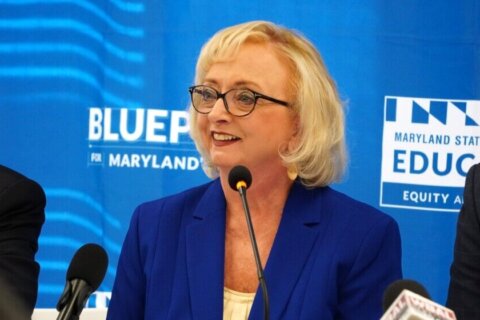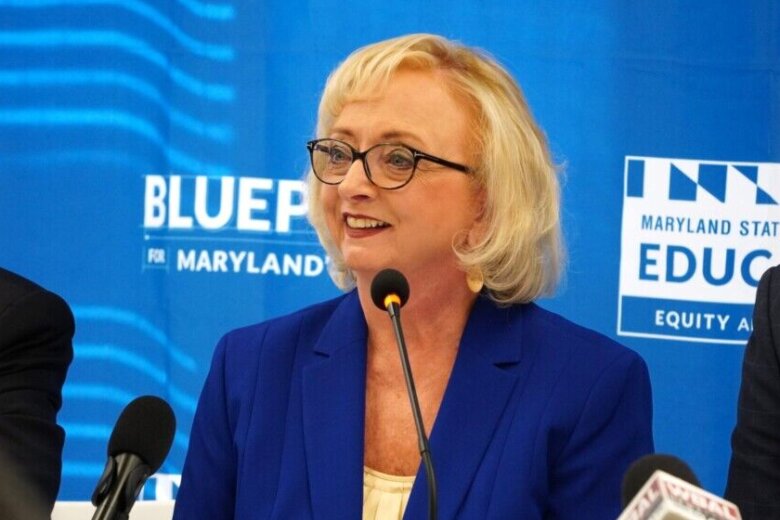This article was republished with permission from WTOP’s news partners at Maryland Matters. Sign up for Maryland Matters’ free email subscription today.
Before Carey Wright begins her work as interim superintendent of Maryland’s public schools Oct. 23, she plans to meet with state Department of Education staff and members of the education community.

Wright hasn’t been able to get “into the weeds, yet” on the Blueprint for Maryland’s Future education reform plan, but she knows the essence of it.
“I think this is a golden moment in public education and we really need to take advantage of it and make sure that what we’re doing is in the best interest of our children,” Wright said Thursday during a press conference at the department in downtown Baltimore.
Wright sat between State Board of Education President Clarence Crawford and Vice President Joshua Michael in the board’s meeting room.
Eight days earlier, the board voted unanimously to select Wright, a Maryland native who graduated from Prince George’s County public schools.
“She was on the top of our list,” Michael said.
Since Wright’s term ends June 30, she was asked if she plans to apply to become the long-term superintendent.
“Yes. I’ll be applying for the position,” said Wright, whose career in education began as a public schools teacher in Prince George’s County in the 1970s.
The school board still plans to conduct a national search to hire a person for four-year term starting July 1, the beginning of the new fiscal year.
In the meantime, Sylvia Lawson, deputy state superintendent for organizational services, began as acting superintendent Saturday.
Former Superintendent Mohammed Choudhury resigned Friday and, the next day, became senior adviser for the state school board, under an agreement he reached with the board. Choudhury will provide education guidance, advice and strategies on state priorities such as the education reform plan.
As part of the agreement, he will continue to receive his base salary of $310,000 on a current contract that expires June 30. He will also have the option to work remotely or at the department’s office in Baltimore.
As for Wright, she has assessed the state’s recent math test scores and, on Thursday, called them “abysmal.”
Wright said collaboration with state lawmakers must also be a priority, something she said she accomplished during her nine years as state superintendent in Mississippi before she retired last year.
“I think that you cannot do this job without having good working relationships with the legislature and elected leaders,” she said. “I’m really looking forward to meeting all the people that are here.”
Most importantly for Wright, she said, is that all children deserve to receive a quality education.
“There is no magic bullet to improving education. If there [were], people would have used that a long time ago,” she said. “It’s hard work over a long period of time helping out teachers and leaders and students in whatever way that we can.”
‘Working relationship’
Several state lawmakers such as Sen. Malcolm Augustine (D-Prince George’s) said the board made “a good decision” in choosing Wright, based on her record as superintendent and efforts that boosted literacy in Mississippi during her tenure there.
Augustine said that, in his view, Wright’s more than three decades of experience working for various school systems in Maryland as a teacher, principal and administrator will be beneficial in achieving the Blueprint for Maryland’s Future education reform plan.
“What I’m hopeful for is a refreshed and renewed emphasis on achieving the goals laid out in the Blueprint,” said Augustine, who serves on the Senate’s Education, Energy and the Environment Committee. “I am very, very encouraged that she will help us to make real progress towards the goals we laid out in the Blueprint.”
His committee colleague, Sen. Mary Beth Carozza (R-Lower Shore), said she hopes Wright and a permanent superintendent hired next year would “have a close, working relationship” with local school leaders and “factor in the input of parents and community when we move forward with the policies of the Blueprint to ensure that we have quality education for all students.”
Collaboration between state education leaders and nonprofit organizations remains a priority for Rene Averitt-Sanzone, president of the Parents’ Place of Maryland. That advocacy group, based in Anne Arundel County, supports and provides resources for families whose children have disabilities and special health care needs.
“With the implementation of the Blueprint how do we truly ensure that ALL really means ALL, including students with disabilities,” she wrote in an email Maryland Matters. Averitt-Sanzone said she hopes that “there will be a renewed commitment of partnering with organizations that share the vision of improved supports for children and families.”








